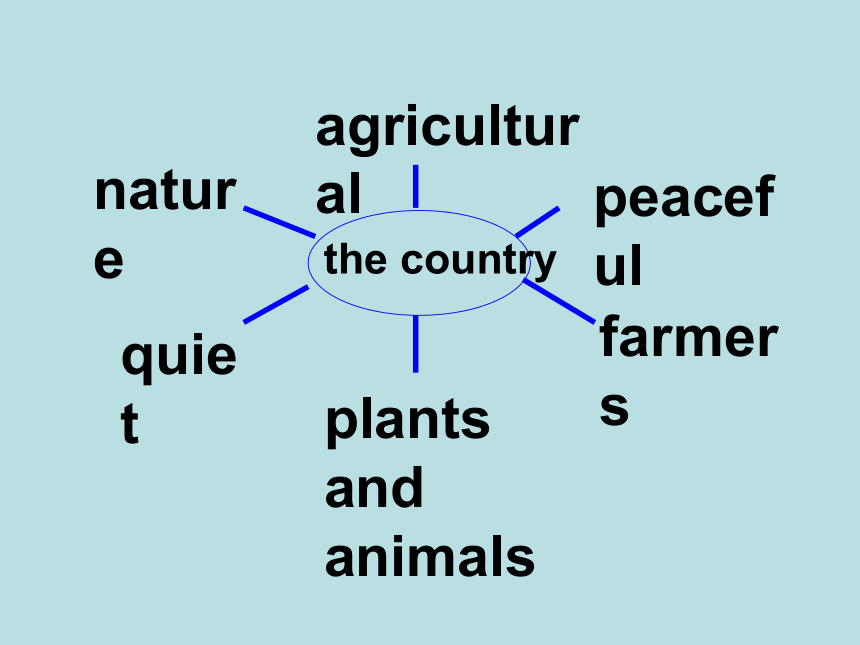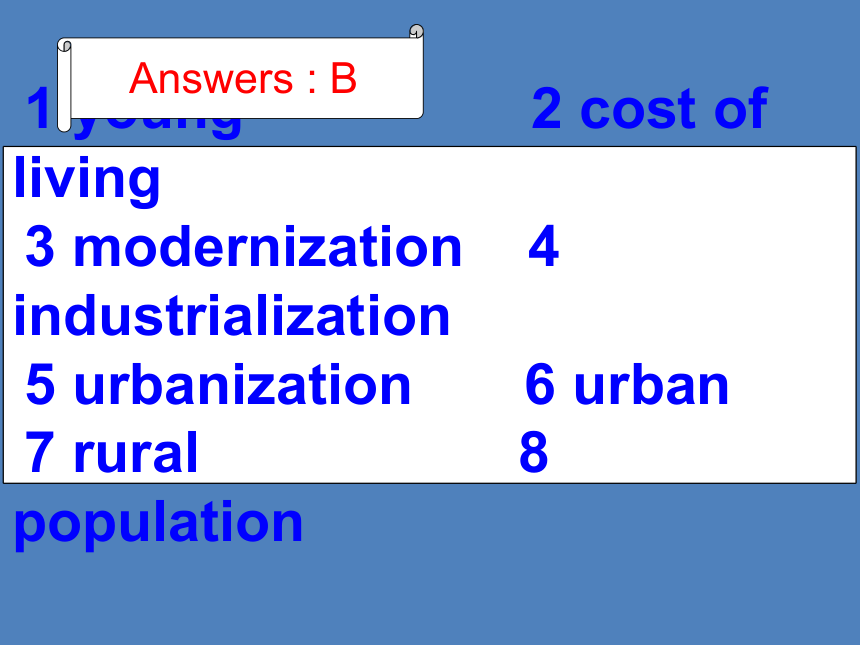高三英语译林牛津版选修10 Unit 2 people on the move Welcome to the unit word power 课件 (共26张PPT)
文档属性
| 名称 | 高三英语译林牛津版选修10 Unit 2 people on the move Welcome to the unit word power 课件 (共26张PPT) |  | |
| 格式 | zip | ||
| 文件大小 | 108.0KB | ||
| 资源类型 | 教案 | ||
| 版本资源 | 牛津译林版 | ||
| 科目 | 英语 | ||
| 更新时间 | 2019-04-09 17:45:34 | ||
图片预览









文档简介
课件26张PPT。With the development of the global and local economy, population mobility has become a new trend in the world. Topic : People on the moveindustrialthe countryWhere would you like to move if you could choose a place to move to? Why?Can you think of any reasons why people are on the move?Discussion to study in a university
to work in a company / school
to be with their family
to live in a nicer environment
to move somewhere for a better quality of life Read the article on page 22, and fill in the blanks in Part B. Reasons for moving1 young 2 cost of living
3 modernization 4 industrialization
5 urbanization 6 urban
7 rural 8 populationAnswers : B Choose the right definition for each word.producing goods in factories
industry
the process by which a place starts to develop industries
industrialization
the countryside
rural area
a way of measuring how good people’s lives are
living standards 生活标准
growing goods on farms
agriculture
area covered by a town or city
urban
the number of people in an area or a country
population h. how expensive people find it to live their everyday life
cost of living 生活费用
the process of introducing new ideas and concepts to the development of an area or a country
modernization
the mass movement people from one place to another
migration patterns
the process of countryside turning into industrial cities
urbanization 都市化Vocabulary extensionSociologyRead the article and fill in the blanks in Part B, Page23
Answers:
1 society and the groups within society
2 secondary socialization 中级社会化
3 norms 准则
4 society, including governments and individualsLanguage points1. Hu Jie attended a seminar about how development affects where people live and why they move. (P22)1). affect v.
Both buildings were badly affected by the fire.
It's a disease which affects mainly older people.
I was deeply affected by the film.take effect 开始生效、起作用 2. She realized that there are reasons for moving within a country other than those mentioned in the magazine article. (P22)她认为除了书中提到的一些原因以外,还有其他的一些搬迁原因。1). other than 除了;other than, except, apart from, besides, but 辨析:(1) except和besides都可作“除……之外” 但含义不同。 We all went except him.?????
We all went besides him.??
He had other people to take care of besides me.
All the students in Class One went to the cinema except Li Ping. (2)二者后面都可以接从句。
①Besides that he explained the theory he gave us some examples.
②He is a good student except that he sometimes comes late to school.
(3)except后面可接for(构成短语except for)或其他介词短语,而besides不能。 except for主要有三层含义:
①表示对整体主要部分的肯定和对局部的否定,起部分修正主要意思的作用。
Your composition is quite excellent except for several spelling mistakes.
②表示非同类事物进行比较。
The street is empty except for several cars.
③置于句首,表达except的含义。
Except for this, everything is in order.
except for后接名(代)词,可以转移为except+从句或其他介词短语。
The climate here is good except for some rainy days. (except when it rains; except that it sometimes rains; except on the rainy days.) 2. apart from兼有besides和except for两种含义,后接名词、代词或动名词。
3. but含义与except相同,都表示递减的概念,二者在多数情况下可以互换,但用法稍有区别。 ①except可以代替but, 但but并不一定都可以代替except. 如果句中有no、all、nobody、who、where等不定代词或疑问词时,多用but;后跟宾语从句时,多用except。
②but for含义有时与except for相同,但主要表示“要不是……”,常用于虚拟句,表示一种假设。 ③but位置的变化会引起人称代词主、宾格的变化。
No one but I knows it.
No one knows it but me. 4. other than含义与except/but相同,都表示从总体中除去一部分,后接名词、代词或不定式。
In that case there is nothing you can do other than wait. (2001上海春) Homework
1. Review what we have learned in Unit 2.
2. Preview Reading.
to work in a company / school
to be with their family
to live in a nicer environment
to move somewhere for a better quality of life Read the article on page 22, and fill in the blanks in Part B. Reasons for moving1 young 2 cost of living
3 modernization 4 industrialization
5 urbanization 6 urban
7 rural 8 populationAnswers : B Choose the right definition for each word.producing goods in factories
industry
the process by which a place starts to develop industries
industrialization
the countryside
rural area
a way of measuring how good people’s lives are
living standards 生活标准
growing goods on farms
agriculture
area covered by a town or city
urban
the number of people in an area or a country
population h. how expensive people find it to live their everyday life
cost of living 生活费用
the process of introducing new ideas and concepts to the development of an area or a country
modernization
the mass movement people from one place to another
migration patterns
the process of countryside turning into industrial cities
urbanization 都市化Vocabulary extensionSociologyRead the article and fill in the blanks in Part B, Page23
Answers:
1 society and the groups within society
2 secondary socialization 中级社会化
3 norms 准则
4 society, including governments and individualsLanguage points1. Hu Jie attended a seminar about how development affects where people live and why they move. (P22)1). affect v.
Both buildings were badly affected by the fire.
It's a disease which affects mainly older people.
I was deeply affected by the film.take effect 开始生效、起作用 2. She realized that there are reasons for moving within a country other than those mentioned in the magazine article. (P22)她认为除了书中提到的一些原因以外,还有其他的一些搬迁原因。1). other than 除了;other than, except, apart from, besides, but 辨析:(1) except和besides都可作“除……之外” 但含义不同。 We all went except him.?????
We all went besides him.??
He had other people to take care of besides me.
All the students in Class One went to the cinema except Li Ping. (2)二者后面都可以接从句。
①Besides that he explained the theory he gave us some examples.
②He is a good student except that he sometimes comes late to school.
(3)except后面可接for(构成短语except for)或其他介词短语,而besides不能。 except for主要有三层含义:
①表示对整体主要部分的肯定和对局部的否定,起部分修正主要意思的作用。
Your composition is quite excellent except for several spelling mistakes.
②表示非同类事物进行比较。
The street is empty except for several cars.
③置于句首,表达except的含义。
Except for this, everything is in order.
except for后接名(代)词,可以转移为except+从句或其他介词短语。
The climate here is good except for some rainy days. (except when it rains; except that it sometimes rains; except on the rainy days.) 2. apart from兼有besides和except for两种含义,后接名词、代词或动名词。
3. but含义与except相同,都表示递减的概念,二者在多数情况下可以互换,但用法稍有区别。 ①except可以代替but, 但but并不一定都可以代替except. 如果句中有no、all、nobody、who、where等不定代词或疑问词时,多用but;后跟宾语从句时,多用except。
②but for含义有时与except for相同,但主要表示“要不是……”,常用于虚拟句,表示一种假设。 ③but位置的变化会引起人称代词主、宾格的变化。
No one but I knows it.
No one knows it but me. 4. other than含义与except/but相同,都表示从总体中除去一部分,后接名词、代词或不定式。
In that case there is nothing you can do other than wait. (2001上海春) Homework
1. Review what we have learned in Unit 2.
2. Preview Reading.
同课章节目录
- 模块9
- Unit 1 Other countries, other cultures
- Unit 2 Witnessing time
- Unit 3 The meaning of colou
- Unit 4 Behind beliefs
- 模块10
- unit 1 building the future
- unit 2 people on the move
- unit 3 protecting ourselves
- unit 4 law and orde
- 模块11
- unit 1 careers and skills
- unit 2 getting a job
- unit 3 the secret of success
- unit 4 the next step
